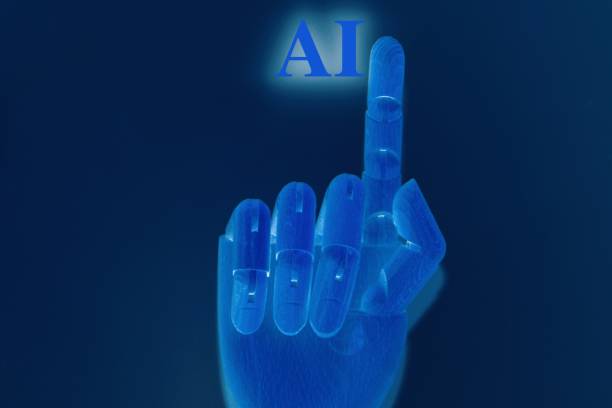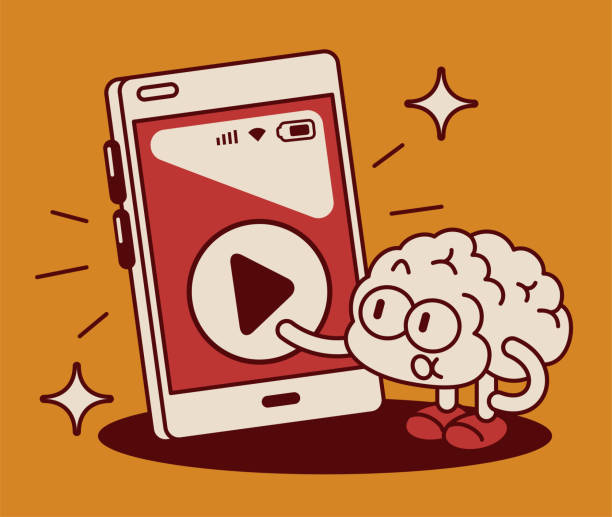What is Artificial Intelligence and How Does it Work?
In short, Artificial Intelligence (AI) is the simulation of human intelligence processes by machines, especially computer systems.
These processes include learning (acquiring information and rules for using it), reasoning (using rules to reach approximate or definite conclusions), and self-correction (improving performance).
The main goal of AI is to create systems that can perform tasks that typically require human intelligence.
These tasks include speech recognition, image recognition, decision-making, problem-solving, and language translation.
AI uses various algorithms and models to achieve these goals.
Some of these algorithms include #machine_learning, #neural_networks, #deep_learning, and #natural_language_processing.
Machine learning allows systems to learn from data without being explicitly programmed.
Neural networks are models inspired by the structure of the human brain and are used to solve complex problems such as image and speech recognition.
Deep learning is a subset of machine learning that uses neural networks with multiple layers to learn more complex patterns.
Natural language processing allows machines to understand and generate human language.
In other words, AI tries to enable computers to think, learn, and act as if they were human.
This field is rapidly advancing and has widespread applications in various industries.
Are you worried that your company’s old website is scaring away new customers? Rasaweb solves this problem by designing a modern and efficient corporate website.
✅ Increases your brand credibility.
✅ Helps attract targeted customers.
⚡ Contact Rasaweb for a free consultation!
Types of Artificial Intelligence: Classification and Applications
Artificial intelligence can be divided into different categories based on capabilities and type of performance.
One of the most common classifications is dividing AI into “Narrow AI” and “General AI.”
Narrow AI is designed to perform a specific task and performs very well in that task.
Examples of narrow AI include virtual assistants like Google Assistant and Siri, product recommendation systems in online stores, and facial recognition systems.
Click here to preview your posts with PRO themes ››
General AI, sometimes called strong AI, has cognitive abilities similar to humans.
A general AI system can perform any task that a human can.
Currently, general AI is still under development, and no complete system with this capability exists.
The ultimate goal of many AI researchers is to achieve general AI.
In addition, AI can be categorized based on how it learns.
Supervised Learning requires algorithms to learn from labeled data.
Unsupervised Learning allows algorithms to find patterns in unlabeled data.
Reinforcement Learning allows systems to learn through trial and error and optimize their decisions based on rewards and penalties.
The applications of AI are vast and include fields such as medicine, education, transportation, manufacturing, customer service, and many more.
AI is changing the shape of the world and is expected to play an increasingly important role in the future.
Types of AI
Applications of Artificial Intelligence in Various Industries
The applications of AI are increasing daily and are affecting almost every industry.
In the field of medicine, AI can help in diagnosing diseases, developing drugs, and providing personalized care to patients.
For example, AI systems can analyze medical images with high accuracy and identify patterns that may be overlooked by doctors.
In the transportation industry, AI plays a key role in the development of self-driving cars.
Self-driving cars use AI algorithms to understand their surroundings, make decisions about the route, and control the vehicle.
This technology can lead to reduced accidents, improved traffic efficiency, and reduced air pollution.
In the manufacturing sector, AI can be used to optimize production processes, reduce costs, and improve product quality.
Smart robots can perform repetitive and dangerous tasks, while AI systems can analyze production data and identify patterns that lead to improved efficiency.
Click here to preview your posts with PRO themes ››
In the customer service sector, AI can be used to provide 24-hour support, answer frequently asked questions, and solve customer problems.
Chatbots and virtual assistants can automatically interact with customers and meet their needs.
In addition, AI has widespread applications in fields such as education, finance, agriculture, and security.
Artificial Intelligence is becoming a fundamental technology that can help solve many of the world’s important challenges.
| Industry | Application |
|---|---|
| Medicine | Disease diagnosis, drug development |
| Transportation | Self-driving cars |
| Manufacturing | Process optimization, robotics |
| Customer Service | Chatbots, 24-hour support |
Advantages and Disadvantages of Artificial Intelligence: A Closer Look
With all its potential, AI has both advantages and disadvantages that should be considered.
The advantages of AI include increased efficiency and productivity, reduced human error, improved decision-making, and the creation of new opportunities.
AI systems can perform tasks faster and more accurately than humans, and they can also analyze large volumes of data and identify patterns that may not be visible to humans.
However, AI also has disadvantages, including high development and deployment costs, the need for large amounts of data for training, the risk of job losses, and ethical concerns related to privacy and security.
Developing AI systems requires significant investment and also requires high-quality, labeled data.
In addition, the widespread use of AI may lead to job losses in some industries, as machines can perform tasks that were previously performed by humans.
Ethical concerns are also one of the most important challenges facing AI.
The use of AI systems in important decisions, such as hiring, lending, and law enforcement, can lead to discrimination and inequality.
Also, the collection and use of personal data by AI systems can threaten people’s privacy.
Therefore, it is necessary to develop laws and regulations to regulate the use of AI to prevent misuse of this technology.
Do you have an online store but your sales are not what you expect? Rasaweb solves your problem forever with professional online store website design!
✅ Significant increase in conversion rates and sales
✅ Unmatched user experience for your customers
⚡ Click to get a free consultation with Rasaweb!
The Future of Artificial Intelligence: What Should We Expect?
The future of AI looks very bright and promising.
With rapid advances in machine learning, natural language processing, and robotics, AI is expected to play an increasingly important role in everyday life and various industries.
In the future, we will see the expansion of AI use in areas such as healthcare, education, transportation, and manufacturing.
Self-driving cars will be increasingly present on the roads, and AI systems will help doctors diagnose diseases and provide personalized treatments.
In the field of education, AI systems can help students learn course material and provide personalized feedback.
In the manufacturing industry, smart robots can perform more complex tasks and optimize production processes.
However, the future of AI also presents challenges.
We need to prepare for these challenges, including ethical, social, and economic issues.
Developing appropriate laws and regulations, training the workforce for new jobs, and ensuring that AI benefits all of society are among the steps that need to be taken.
Artificial Intelligence
How is Artificial Intelligence Changing Our Lives?
AI is already having a profound impact on our lives, and this impact will increase in the future.
From virtual assistants on smartphones to product recommendation systems in online stores, AI is present in many aspects of our daily lives.
AI helps us perform tasks faster and more efficiently, make better decisions, and access more information.
AI systems can filter emails, summarize news, and automatically translate languages.
Also, AI can help us find optimal routes, manage finances, and improve health.
However, AI also creates challenges for our lives.
The use of AI systems in important decisions can lead to discrimination and inequality.
Also, the collection and use of personal data by AI systems can threaten our privacy.
Therefore, it is necessary to be aware of how AI is used in our lives and to protect our rights.
In short, AI has the potential to significantly improve our lives, but it is necessary to be aware of its challenges and take steps to address them.
Machine Learning: The Beating Heart of Artificial Intelligence
Machine Learning is one of the most important and widely used sub-branches of artificial intelligence.
In fact, many modern AI systems are based on machine learning algorithms.
Machine learning allows systems to learn from data without being explicitly programmed.
In other words, systems can identify patterns in data and use these patterns to make predictions or decisions.
There are different types of machine learning algorithms, including supervised learning, unsupervised learning, and reinforcement learning.
Supervised learning requires algorithms to learn from labeled data, while unsupervised learning allows algorithms to find patterns in unlabeled data.
Reinforcement learning allows systems to learn through trial and error and optimize their decisions based on rewards and penalties.
The applications of machine learning are very broad and include fields such as image recognition, speech recognition, natural language processing, and data analysis.
Facial recognition systems, virtual assistants, and product recommendation systems all use machine learning algorithms.
Machine learning is changing the shape of the world and is expected to play an increasingly important role in the future.
With rapid advances in this field, we will see the expansion of machine learning use in various industries.
Ethical and Social Challenges of Artificial Intelligence
As AI advances and expands, the ethical and social challenges associated with it also increase.
One of the most important of these challenges is the issue of discrimination and inequality.
AI systems can make decisions that unintentionally lead to discrimination against specific groups of people.
This can be caused by training data that contains biases, or by algorithms that are unfairly designed.
The issue of privacy is also another important challenge facing AI.
AI systems need to collect and use personal data to function.
This can threaten people’s privacy, especially if this data is used inappropriately or is hacked.
In addition, there are concerns about the impact of AI on employment.
With the advancement of AI, many jobs may be replaced by machines and automated systems.
This can lead to increased unemployment and economic inequality.
To address these challenges, it is necessary to develop appropriate laws and regulations to regulate the use of AI.
Also, it is necessary to raise awareness about the ethical and social issues of AI and prepare people to face these challenges.
Artificial Intelligence
| Challenge | Description |
|---|---|
| Discrimination | Unfair decisions based on biased data |
| Privacy | Collection and use of personal data |
| Employment | Job replacement by machines |
Are you tired of your company’s website not meeting your expectations? With Rasaweb, design a professional website that showcases the true face of your business.
✅ Increased attraction of new customers and sales leads
✅ Increased credibility and trust of your brand with the audience
⚡ Get a free website design consultation!
How Can We Use Artificial Intelligence Responsibly?
Responsible use of AI requires a joint effort from governments, companies, and individuals.
Governments should develop laws and regulations to regulate the use of AI that protect the rights of individuals and prevent misuse of this technology.
Companies should pay attention to ethical issues in the development and deployment of AI systems and avoid using biased data and unfair algorithms.
Individuals should also be aware of how AI is used in their lives and protect their rights.
This includes awareness of how personal data is collected and used, as well as awareness of the potential risks of discrimination and inequality.
In addition, it is necessary to increase education and awareness about AI.
People should be aware of the potential and risks of AI so that they can make informed decisions about the use of this technology.
Also, it is necessary to train the workforce for new jobs that are created by AI.
By cooperation and joint efforts, we can use AI responsibly and benefit from its advantages, while minimizing its risks.
Artificial Intelligence in Iran: Current Status and Prospects
Artificial intelligence in Iran has also been considered as an important and strategic technology.
The Iranian government has developed programs to develop AI in the country and is making efforts to support knowledge-based companies and startups active in this field.
Universities and research centers are also conducting research projects in the field of AI.
However, AI in Iran is still in the early stages of development and faces challenges.
One of the most important of these challenges is the shortage of specialized and trained personnel in the field of AI.
Also, the lack of high-quality data and appropriate infrastructure are other challenges facing the development of AI in Iran.
Despite these challenges, the outlook for AI in Iran looks positive.
With the increasing attention of the government and the private sector to this technology, and with efforts to overcome the existing challenges, AI is expected to play a more important role in Iran’s economy and society.
Artificial Intelligence
Frequently Asked Questions
| Question | Answer |
|---|---|
| What is the definition of AI (Artificial Intelligence)? | It is a field in computer science that aims to create intelligent machines that can think, learn, solve problems, and make decisions like humans. |
| Mention some common AI applications. | Includes self-driving cars, voice assistants (such as Siri and Alexa), recommendation systems (such as Netflix and Amazon), facial recognition, and medical diagnosis. |
| What is the difference between Narrow AI (ANI) and General AI (AGI)? | Narrow AI is specialized in a single and specific task, while General AI possesses human intellectual ability to perform any cognitive task. |
| What is Machine Learning and its relationship to AI? | Machine learning is a branch of artificial intelligence that focuses on developing algorithms that allow systems to learn from data without explicit programming. |
| What are Artificial Neural Networks? | They are computational models inspired by the structure and function of the human brain, and are used in deep learning to process data and discover complex patterns. |
| Mention some ethical challenges related to AI. | Includes issues of privacy, bias in data and algorithms, job loss, and responsibility in case of errors or unfair decisions. |
| What is Natural Language Processing (NLP)? | It is a branch of artificial intelligence that focuses on enabling computers to understand, interpret, and generate human language in a useful and interactive way. |
| How can AI affect the labor market? | It can lead to the automation of some routine tasks, requiring retraining of workers and creating new jobs in the fields of design, development, and maintenance of AI systems. |
| What is Computer Vision? | It is a field in AI that enables computers to “see,” understand, and interpret images and videos in the same way that humans do, enabling them to recognize objects and faces. |
| What is the importance of data in developing AI systems? | Data is the fuel that feeds AI systems, especially in machine learning. The quality and quantity of data significantly affect the accuracy and performance of models and their ability to learn and make correct decisions. |
And other Rasa Web advertising agency services in the field of advertising
Smart digital branding: A combination of creativity and technology to manage campaigns by using real data.
Smart data analysis: A professional solution to improve SEO ranking with a focus on smart data analysis.
Smart data analysis: An innovative platform to improve user interaction with custom programming.
Smart UI/UX: Professional optimization for campaign management using custom programming.
Smart Customer Journey Map: Transform website traffic by helping optimize key pages.
And more than hundreds of other services in the field of internet advertising, advertising consulting, and organizational solutions
Internet advertising | Advertising strategy | Reportage ad
Resources
What is artificial intelligence and how does it work?
,What is artificial intelligence? A complete introduction to artificial intelligence and its applications
,What are the applications of artificial intelligence in modern life?
,What is artificial intelligence? All about artificial intelligence
? With Rasaweb Afarin, transform your business in the digital world! From powerful SEO to multilingual website design, we have comprehensive solutions for your growth and visibility.
📍 Tehran, Mirdamad Street, next to the Central Bank, South Kazerun Alley, Ramin Alley No. 6
“`













